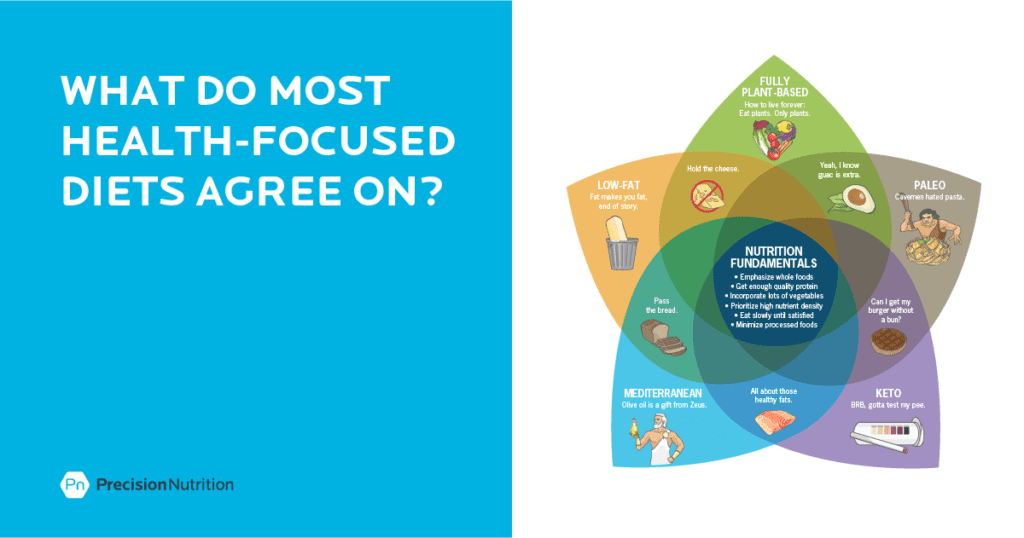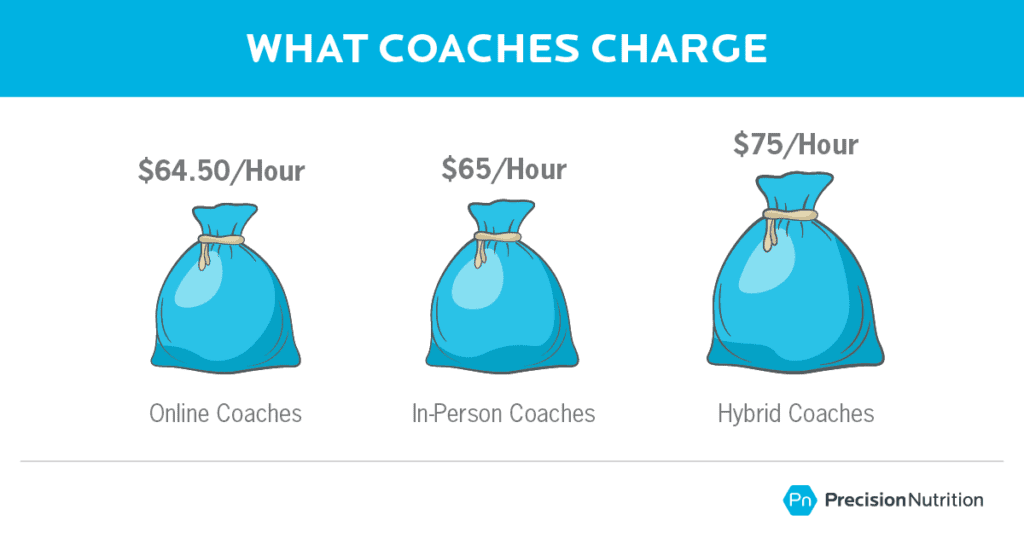What do a doctor, dietitian, licensed clinical social worker, side-hustling nutrition coach, and personal trainer all have in common?
No, this isn’t the beginning of a terrible joke…
The answer: We interviewed people in each of these careers, and they all said getting a nutrition certification was worth it.
But is a nutrition certification worth it, for you?
In this article, we’ll explore that question.
The truth is, a nutrition certification’s worth-it score depends on your situation.
To help you weigh all the pros and cons, we put together this comprehensive guide, complete with a free self-assessment tool to help you make the decision for yourself.
In this article, you’ll also find:
- The essential questions to consider before getting a nutrition certification.
- 5 unexpected side benefits of getting certified.
- Why a nutrition certification often translates into greater client success.
- How a nutrition certification can boost your income potential.
- Insights from seven successful certified nutrition coaches from a wide range of professions.
(Sign up for our FREE newsletter, The Smartest Coach in the Room. Every week you’ll get helpful takeaways on the hottest nutrition and health topics and the world’s most effective coaching techniques.)
++++
5 questions that’ll help you decide if a nutrition certification is worth it
Figuring out whether a nutrition certification is worth it can be tricky. In part, because we all define “worth it” differently.
For instance, is a nutrition certification worth it if you:
- Gain knowledge you need to achieve your career goals?
- Earn more money because of it?
- Get more clients or new opportunities afterwards?
- Learn something that changes your nutrition philosophy?
- Create connections with like-minded people in your industry?
Consider the following questions to define what “worth it” means to you.
How to use this quiz to make your decision
Each section below ends with a question. You’ll rank your response on a scale from 0 to 5. (Just click the number on your screen, and your results will automatically populate at the end of the quiz.)
Once you’ve answered all five questions, you’ll get a worth it/not worth it result.
If you’re not sure how to answer one or more of the 5 questions (or just want to consider it from multiple angles), you’ll find boxes labeled “dig deeper” with prompts for further reflection.
Our advice: Keep a journal handy. Jot down your thoughts so you’ll have something to refer to when making your decision.
Question #1: Does a nutrition certification fill a gap in your knowledge?
A nutrition certification is worth it if it helps you gain key knowledge or skills, according to the coaches we interviewed.
Here are a few real-life examples of how a nutrition certification can fill knowledge gaps.
The personal trainer who wanted to master nutrition
The release of a massively popular Netflix nutrition documentary, coupled with a resulting deluge of client questions, made personal trainer Tyler Buckingham, PN1, PPSC, realize the full extent of nutrition misinformation.
He wanted to better understand the discussion as well as be able to answer client questions with authority. “I was like, okay, it’s time to get certified in nutrition,” says Buckingham, who trains a group of former athletes.
Since getting certified, he’s much more adept at answering the nutrition questions clients lob his way—especially tricky ones with no clear answer.
“I like having that flexibility and being able to say, ‘Hey, you could try this, or you could try that. What do you want to do? Let’s have a conversation about it.’”
In the end, Buckingham knows his clients are getting answers to their questions, and the actionable advice they need to keep moving forward.
The doctor who wanted to give better advice
A family medicine resident and CrossFit Level 1 coach, Kristina Hines, DO, PN1, felt confident talking to patients about exercise. But the few hours of nutrition education she got in medical school just weren’t cutting it.
“I didn’t really know what to tell patients nutritionally,” she says.
Her patients often had specific questions about how to eat, whether various diets were right for them, and what foods calmed their symptoms.
Dr. Hines wanted a deeper level of nutritional understanding, so she decided to pursue a nutrition certification.
Thanks to the certification course, Dr. Hines now feels comfortable answering just about any nutrition question patients come up with.
The registered dietitian who wanted to learn about behavior change
Jennifer Broxterman, MS, RD, was already a dietitian when she got her nutrition certification. But she wanted to learn more about the psychology of behavior change and motivational interviewing.
“As a university professor, I like to see different teaching methods and different learning styles,” she says.
For her, getting a Precision Nutrition Level 1 certification meant gaining perspective on how behavior change actually works, so she could better implement it with her clients.
Will a nutrition certification fill a gap in your knowledge?
Dig deeper
- What are you hoping to learn from a nutrition certification? How will the certification help you learn it?
- What skills would help you reach more people, or improve your work with them? Could a nutrition certification help?
- How do you feel when nutrition questions come up? How does that compare to how you’d like to feel?
Question #2: Will a nutrition certification bring you additional and valuable benefits?
People often cite benefits of becoming certified that go beyond their initial reason for doing so, such as:
- enhanced credibility
- more confidence
- improved communication skills
- opportunities to learn from peers and experts in the field
- a healthier relationship with food
Below, we’ll cover each of these benefits in detail, so you can decide if they’re worth it for you.
Benefit #1: Enhanced credibility
After Vivian Gill, MA, RN-BC, CPT, earned her nutrition certification, she noticed something that surprised her: “My credibility increased,” says the registered nurse, personal trainer, and lifestyle coach. “Clients know I’m evidence-based and not biased, and they’ve felt the difference.”
Gill saw that lots of other trainers in her community pushed dieting, counting macros, and detoxing. Her nutrition certification helped her realize that a different approach would resonate more with her clients.
“I’ve decided to be the voice of reason and grace,” she adds.
Benefit #2: More confidence
What does Buckingham see as the biggest hidden benefit of getting certified? “Definitely the confidence I have now,” he says.
Not long ago, a client came to him wanting to lose weight. During their intake, Buckingham learned the client had already lost several pounds. Clearly, the person was doing a lot right.
In the past, Buckingham would have felt pressured to deliver a completely different program—for the sake of it. Thanks to what he learned from his certification, however, he confidently encouraged his client to keep going with some of the same strategies.
Buckingham also feels more at ease talking about nutrition’s gray areas.
Instead of claiming to know it all, he feels comfortable saying: “Hey, I don’t know the answer to this question, but I’ll find out,” or “Why don’t we see if it works? Then after a week, we can see what happened, and take it from there.”
Benefit #3: Improved coaching and communication skills
Some nutrition certification courses, like Precision Nutrition Level 1, include information on the art of coaching as well as nutrition science. In other words, part of the course trains you to talk to your clients more effectively. (Want to see what we mean? Check out our FREE Nutrition Coaching e-course.)
Josh Chang, PN1, a dietitian and owner of Mycro Nutrition, says getting a certification was worth it for him because it taught him how to talk to clients about their barriers.
“Dietitians are trained to use a little bit of motivational interviewing and empathize with clients, but Precision Nutrition teaches you to take that one or two steps further—to get to know the client and how to dig into why they might be saying what they say or doing what they’re doing.”
“A nutrition certification may be worth it if you need a little help strengthening those communication or rapport building skills,” he adds.
Benefit #4: Opportunities to learn from peers and experts in the field
Some nutrition certifications offer Facebook groups, online forums, and even in-person events. These resources provide coaches with a chance to connect with like-minded health professionals, get input from others on challenges and, in some cases, access top experts in the nutrition field.
Having a large community of coaches at his fingertips was one of the biggest unexpected benefits for Chang.
“Once you enroll in PN Level 1 or 2, you get invited to a Facebook group. I particularly enjoy seeing how different coaches respond when people post questions. Some coaching suggestions are just so out of left field, in a good way. I’m like, ‘I would’ve never thought of that, but it’s brilliant.’”
Benefit #5: A healthier relationship with food
Jenna Ashby PA-C, PN1, an oncology physician assistant, decided to become a nutrition coach after overcoming disordered eating.
Though Ashby primarily uses her nutrition certification in her side job at Breathe CrossFit in Derry, New Hampshire, she also came away from the experience with some personal takeaways.
“It helped solidify what I’ve been building upon the last few years, and it helped me find more peace with myself,” says Ashby. “I now know, without a doubt: I can love my body, be okay with my body, and appropriately nourish it.”
“That’s huge because I once thought that, if I wanted to eat, I had to exercise, or vice versa. Now, that mentality is reversed: In order to be strong and feel strong I need to nourish myself. The PN certification really solidified that for me,” she says.
Will a nutrition certification bring you additional and valuable benefits?
Dig deeper
- How would you like clients to view your knowledge about nutrition, and how do you think you’re currently measuring up to that?
- How confident do you feel about your nutrition recommendations when working with clients? When you aren’t sure about something, how do you handle it?
- How would you rate your current coaching and communication skills? When you talk to people about nutrition, how does your message seem to be received?
- Where do you currently connect with peers and experts in your field? How might you benefit from additional opportunities?
- How would you describe your current nutrition philosophy and your relationship with food? Is there room for improvement here?
Question #3: Does a nutrition certification line up with your career goals?
A nutrition certification enables you to make nutrition recommendations to otherwise healthy clients.
With a nutrition certification, you’ll be qualified to:
- Give the right nutrition advice at the right time
- Develop an action plan your clients will actually follow
- Help people transform their bodies and their health
These qualifications can be useful in a variety of careers.
What are your career opportunities with a nutrition certification?
People often wonder if they need to go to (or go back to) a university to get started with a career in nutrition. For certain jobs (such as registered dietitian), you need a specialized degree and training.
But there’s also a lot you can do with a nutrition certification alone. Coaches in our community have job titles like:
- Nutrition coach
- Sports nutrition coach
- Weight loss coach
- Weight management consultant
- Corporate wellness educator
- Nutrition program manager at a gym or other health facility
- High-performance consultant
- Stay-at-home parent and part-time nutrition coach
If you already have additional certifications or degrees (or plan to get them), there may be other career options. Some PN-certified coaches are also:
- Registered dietitians
- Sports nutritionists
- Personal trainers and strength coaches who do nutrition coaching
- Physical therapists who do nutrition coaching
- Doctors, nurses, and physician assistants who do nutrition coaching
- Psychologists, psychotherapists, and social workers who do nutrition coaching
What are you not qualified to do?
It’s important to note that Medical Nutrition Therapy (MNT)—which involves giving nutrition advice to treat or cure disease—is out of scope unless you’re specifically MNT-accredited. You won’t be qualified to do this with a nutrition certification alone, and you should never try.
Depending on where you live, rules and regulations vary on what people with nutrition certifications are allowed to do.
For instance, in some states in the US, the only people who can provide meal plans are registered dietitians. But in these states, nutrition coaches can still help people with their eating as long as they’re not telling people exactly what they should and shouldn’t eat.
If you take a Precision Nutrition certification, you’ll learn that meal plans, deeming foods “off-limits,” and telling people exactly what to eat aren’t our style anyway. In our nutrition certification, you’ll learn how to get results without using these tactics.
Does a nutrition certification line up with your career goals?
Dig deeper
- How can nutrition coaching fit into your current job? Or are you looking to pursue a new career in nutrition?
- Take a look at the job titles listed above. Which ones sound interesting to you and/or resonate with your career goals?
- Do you need a nutrition certification to be qualified (or feel confident enough) to hold the job titles you listed in the previous question? Why or why not?
Question #4: Will a nutrition certification help the clients you work with (or want to work with)?
Our grads say a nutrition certification can help you provide a better service to your clients (or potential clients). This service can not only focus on what they eat, but also how they think, feel, and go about their daily routine. (We call this “deep health” coaching.)
This allows you to figure out what’s really holding clients back from making the lasting changes they really want.
That’s important since many people get a nutrition certification, at least partly, because they want to help people—even if it’s their friends or family members. So it’s worthwhile to consider how getting certified will help the people you work with (or eventually want to work with).
For instance, Buckingham now includes nutrition coaching his personal training clients as an added value service. “If you’re meeting me in person, I’ll often say, ‘Hey, let’s talk nutrition. Let’s make sure that you get those questions answered,’” he explains.
Getting a nutrition certification may also improve client experiences. “I think it’s made me a better practitioner,” Dr. Hines says.
Developing her motivational interviewing skills, she says, helped her approach conversations about nutrition in a way that makes patients feel more at ease.
“Now, I’m able to meet my patients where they are instead of having them feel like I’m just lecturing them. I really try to empower patients to know that they have a say in this. It’s not just me telling them what they have to do.”
Lastly, a nutrition certification may help clients get better results.
For example, Kelly Lynch, LCSW, EMT, CPT, PN1, a therapist who specializes in treating first responders, began suggesting clients talk to their physicians about blood work and other diagnostic tests, especially when she suspected their mental health symptoms might be related to (or exacerbated by) nutritional deficiencies, GI dysfunction, or hormonal issues.
When one of her clients described worsening depression along with digestive issues, Lynch thought of a condition she’d learned about during her certification that could contribute to these symptoms: SIBO (small intestinal bacterial overgrowth). She encouraged the client to ask their doctor about it.
Sure enough, testing revealed Lynch’s hunch was correct, and the client’s depression improved once the SIBO was treated.
Will a nutrition certification help your clients?
Dig deeper
- What additional value would your clients receive if you got a nutrition certification?
- How would more knowledge and better coaching/communication skills improve clients’ experiences?
- In what way would nutrition and coaching expertise help your clients get better results?
Question #5: Will a nutrition certification boost your income potential, or provide other financial benefits?
Based on our survey of 1000 nutrition coaches and additional independent research, coaches with a nutrition certification earn slightly more per hour than coaches without one.
If you have two to three certifications, you’ll earn an average $12 more per hour than coaches with just one.
And coaches with a Precision Nutrition certification earn 11 percent more than people with other certifications.
So it’s safe to say that, on average, certified coaches earn more.
For Chang, getting a nutrition certification was the impetus to start his own coaching business, getting him out of a hospital nutrition setting and into the driver’s seat of his own career and earning potential.
Lynch experienced greater interest in her therapy services after sharing that she’d gotten certified in nutrition. It also helped her launch a coaching side business, providing an additional revenue stream.
For some, a nutrition certification might be an avenue to saving money. In addition to enabling her to start a side job as a nutrition coach, Ashby says getting certified meant she no longer felt like she needed to pay for nutrition coaching from someone else. Now, she feels totally confident adjusting her own eating habits.
Will a nutrition certification boost your income potential, or provide other financial benefits?
Dig deeper
- Will getting a nutrition certification allow you to charge clients more than you are currently, or offer new services?
- How might getting certified in nutrition increase interest in your services? Could it help expand your client base?
- How might getting a nutrition certification potentially save you money, in terms of services you’ll no longer need or outsourcing you’ll no longer have to do?
So is a nutrition certification worth it?
YOUR TOTAL SCORE: –
Now find your score range to see if a nutrition certification is worth it.
20 and above: Yes, a nutrition certification is worth it for you!
Based on your answers, it sounds like a nutrition certification will pay off. By getting certified, you’ll level up your:
- nutrition science and coaching knowledge
- career opportunities and coaching services
- ability to help clients
- income potential
- and so much more.
6 to 19: A nutrition certification might be worth it for you.
Based on your answers, it sounds like a nutrition certification will pay off in some ways, but might not in others.
The big question for you to consider: Do the likely benefits outweigh the costs?
To answer that, take another look at your quiz answers, specifically at the ones where you scored a 4 or 5.
Compare the benefits with the cost associated with getting certified.
For example, let’s say you ranked high for a certification filling a knowledge gap as well as for it likely bringing in more income. For costs, maybe you already have the money set aside as well as the time to take and pass a course. In that case, you’ll likely decide that a certification is worth it.
On the other hand, let’s say you picked 5 for a certification lining up with your career goals. For all of the other questions, you choose a 3 or lower. On top of that, you’d have to borrow money to pay for a certification. And you’re already working two jobs. Oh, and you’ve got a baby on the way. Well, a certification might not be worth it to you—not right now anyway.
5 and under: It doesn’t seem like a nutrition certification is worth it for you.
Based on your answers, it’s not clear that you’ll find a nutrition certification to be worth it. That said, there are always exceptions.
You might be interested in getting a certification just for your own personal benefit—not for your career. You may not want to work with clients, earn money through nutrition coaching, or change jobs, and that’s totally legit.
No matter what you decide, it’s important to have a clear picture of your reasoning. Hopefully, that’s what you’ve gained through this self-assessment.
Where to go from here
If you decide to get a nutrition certification, you have quite a few programs to choose from.
For guidance, check out this in-depth article: How to choose the right nutrition certification program for YOU.
Learning how to coach clients, patients, friends, or family members through healthy eating and lifestyle changes—in a way that’s personalized for their unique body, preferences, and circumstances—is both an art and a science.
If you’d like to learn more about both, consider the Precision Nutrition Level 1 Certification. The next group kicks off shortly.





Share